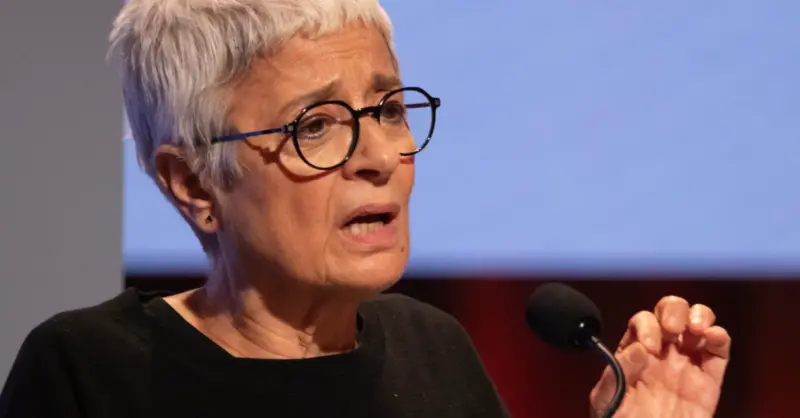


Outgoing BBC World Service director Liliane Landor has warned the organisation “cannot be overtaken by better-resourced competitors” in a speech urging proper resourcing for the service.
Speaking at one of a series of events spotlighting the work of the World Service Landor said the BBC “cannot afford to be left behind through economic necessity” as Russia and China step up investment in their foreign-facing media efforts.
Landor’s speech led into a series of presentations about the World Service’s use of open-source intelligence techniques to investigate stories overseas, touching on the Russian invasion of Ukraine, Chinese involvement in Africa and the ongoing Israel-Hamas war.
Landor said that “72% of our audience comes from countries with no or low media freedom”, which she said meant World Service journalists operate “in a very challenging environment”.
The World Service announced last week that more than 300 of its journalists, approximately 15% of the total, are working in exile.
Historically funded by the Foreign Office, since 2014 the World Service has been mostly paid for through the licence fee with partial support from the Government. In the most recent financial year the World Service was funded with £249m from the licence fee and £103m from the UK Government.
The week before Landor made her speech the House of Commons International Development Committee launched an inquiry into the future of funding the service, apparently prompted by remarks made in March by BBC director-general Tim Davie in which he said “we cannot keep asking UK Licence Fee payers to invest in [the World Service] when we face cuts to UK services…
“Russia and China are investing hard, and not properly funding one of the UK’s most valuable soft power assets makes no sense economically or culturally.”
Landor told the audience last week that “the challenge for me, for us, is how to remain present on the ground and relevant for our audiences amongst fierce competition from state actors like Russia and China”, who she said were “investing heavily in Africa, in Asia, in the Caribbean, in the Middle East, in old and new Media”.
“We need to compete. And in order to compete, we need resources, and we need to remain relevant.”
Neither China nor Russia are new to international, English-language broadcasting, but in the past decade news outlets associated with their governments have become much more prominent than before.
In December Press Gazette reported Chinese state broadcaster CGTN has set up a “content exchange” through which it distributes free, professional-quality video news packages to any newsrooms that want them. Some of the content advances the goals or viewpoint of the Chinese government, for example regarding the large-scale detention of Uyghurs in Xinjiang.
Last month Landor informed colleagues she will be leaving the World Service in July, saying she was “deeply concerned about the operational capability of the World Service if additional cuts continue to weaken it further”.
Speaking last week, she said: “Ultimately… what the World Service needs in order to remain an effective broadcaster has not changed since its inception. It’s about three things, simple things: we need sustainable funding, we need unwavering editorial independence and we need a clear strategic purpose…
“We cannot be overtaken by better-resourced competitors. And we simply cannot afford to be left behind through economic necessity. We cannot allow the World Service to be depleted.”
In 2022 the BBC announced plans to shed nearly 400 jobs in the World Service, end ten foreign language radio services and move seven foreign language services online-only as part of a cost-cutting exercise. The licence fee has been under strain recently after it was frozen against inflation for two years, creating what the corporation says will ultimately be a £400m funding shortfall by the end of the current settlement in 2027.
The most recent BBC annual report revealed the weekly reach of the World Service had declined 12% year-on-year to 318 million people.
During a question and answer session after the presentations last week, BBC Africa Eye executive producer Daniel Adamson similarly said that “no other country in the world has anything like” the World Service.
“The Russians and the Chinese would love to have something that has 10% of the reach of the World Service… but it’s too late now — there is only one, and it has been created over a century. It could not be created now.”
Email pged@pressgazette.co.uk to point out mistakes, provide story tips or send in a letter for publication on our “Letters Page” blog